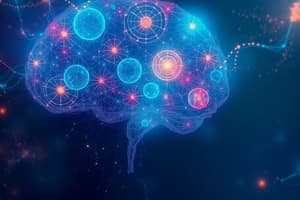Podcast
Questions and Answers
Match the following psychological concepts with their definitions:
Match the following psychological concepts with their definitions:
Bottom-Up Processing = Processing sensory information as it is perceived Top-Down Processing = Using prior knowledge to interpret sensory information Selective attention = Focusing on a particular object in the environment Cocktail party effect = Being able to focus on a single conversation in a noisy crowd
Match the following terms with their examples:
Match the following terms with their examples:
Inattentional Blindness = Failing to notice a visible object when focusing on another task Change Blindness = Not noticing a change in a visual stimulus Mental set = Approaching a problem in a way that has worked in the past Priming = Exposure to one stimulus influences a response to another stimulus
Match the following fallacies with their descriptions:
Match the following fallacies with their descriptions:
Gambler’s fallacy = Believing past independent events affect future outcomes Sunk-cost fallacy = Continuing a behavior due to previously invested resources Framing = Drawing different conclusions from the same information based on presentation Schema = Cognitive frameworks that help organize and interpret information
Match the following depth perception cues with their definitions:
Match the following depth perception cues with their definitions:
Match the following memory concepts with their descriptions:
Match the following memory concepts with their descriptions:
Match the Gestalt principles with their definitions:
Match the Gestalt principles with their definitions:
Match the following types of memory interference with their definitions:
Match the following types of memory interference with their definitions:
Match the following concepts with their applications:
Match the following concepts with their applications:
Match the following research methodologies with their purposes:
Match the following research methodologies with their purposes:
Match the psychological concepts related to attention and perception:
Match the psychological concepts related to attention and perception:
Match the following terms with their psychological significance:
Match the following terms with their psychological significance:
Match the following heuristics with their explanations:
Match the following heuristics with their explanations:
Match the following stages of memory processing with their characteristics:
Match the following stages of memory processing with their characteristics:
Match the following types of amnesia with their descriptions:
Match the following types of amnesia with their descriptions:
Match the following memory effects with their definitions:
Match the following memory effects with their definitions:
Match the following intelligence theories with their brief explanations:
Match the following intelligence theories with their brief explanations:
Flashcards
Bottom-Up Processing
Bottom-Up Processing
Information processing that starts with sensory input and works its way up to higher-level processing.
Top-Down Processing
Top-Down Processing
Information processing that starts with higher-level mental processes and works its way down to sensory input.
Selective Attention
Selective Attention
The focusing of conscious awareness on a particular stimulus.
Cocktail Party Effect
Cocktail Party Effect
Signup and view all the flashcards
Inattentional Blindness
Inattentional Blindness
Signup and view all the flashcards
Change Blindness
Change Blindness
Signup and view all the flashcards
Mental Set
Mental Set
Signup and view all the flashcards
Schema
Schema
Signup and view all the flashcards
Accommodation
Accommodation
Signup and view all the flashcards
Heuristic
Heuristic
Signup and view all the flashcards
Encoding
Encoding
Signup and view all the flashcards
Storage
Storage
Signup and view all the flashcards
Retrieval
Retrieval
Signup and view all the flashcards
Short-term memory (aka working memory)
Short-term memory (aka working memory)
Signup and view all the flashcards
Maintenance rehearsal
Maintenance rehearsal
Signup and view all the flashcards
Forgetting curve (memory)
Forgetting curve (memory)
Signup and view all the flashcards
Study Notes
Matching Concepts and Definitions
- Matching psychological concepts with their definitions: This involves connecting a term from psychology with its accurate meaning or explanation.
- Matching terms with their examples: In this task, students link psychological terms to concrete situations, instances, or behaviors that illustrate the term.
- Matching fallacies with their descriptions: This requires associating logical errors or faulty reasoning patterns with their corresponding descriptions.
- Matching depth perception cues with their definitions: This focuses on associating visual cues that help us perceive depth with their specific explanations.
- Matching memory concepts with their descriptions: This entails connecting memory-related terms with their corresponding descriptions, highlighting processes or phenomena related to remembering.
- Matching Gestalt principles with their definitions: This involves connecting the principles of how we organize visual information with their definitions, highlighting how we perceive patterns and wholes.
- Matching types of memory interference with their definitions: This focuses on associating different forms of interference that hinder memory with their descriptions.
- Matching concepts with their applications: This requires connecting psychological concepts with practical situations or areas where they are relevant.
- Matching research methodologies with their purposes: This involves associating research methods used in psychology with the goals they are designed to achieve.
- Matching psychological concepts related to attention and perception: This requires connecting terms related to how we focus and process information with their definitions.
- Matching terms with their psychological significance: This involves connecting psychological terms with their importance or implications in understanding human behavior or mental processes.
- Matching heuristics with their explanations: This focuses on connecting mental shortcuts or decision-making strategies with their descriptions, outlining how they work.
- Matching stages of memory processing with their characteristics: This involves linking stages of memory processing (encoding, storage, retrieval) with their key features.
- Matching types of amnesia with their descriptions: This requires connecting different types of memory loss with their specific descriptions.
- Matching memory effects with their definitions: This focuses on associating phenomena or patterns related to memory with their explanations.
- Matching intelligence theories with their brief explanations: This involves connecting different theories of intelligence with concise explanations of their main ideas.
Studying That Suits You
Use AI to generate personalized quizzes and flashcards to suit your learning preferences.




